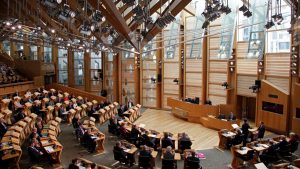The Scottish Parliament has gained its first law-making powers under the Scotland Act 2016.
Holyrood can now legislate on new areas such as equal opportunities, abortion law, speed limits and gaming machines.
Additional new powers on tax, welfare, Air Passenger Duty and the licensing of onshore oil and gas extraction are due to be transferred at later dates.
Scotland’s constitution secretary said it was the most substantial change to Holyrood’s powers since devolution.
Derek Mackay also pledged that the new powers would be used to create “a fairer country”.
The UK government’s Scottish Secretary David Mundell said the Scottish Parliament was now “one of the most powerful devolved administrations in the world”.
The Scotland Act was passed at Westminster in March following the Smith Commission review of devolution.
In addition to the new legislative powers, Scottish ministers will be able to make appointments to the Gaelic media service MG Alba, and decide whether public sector operators can bid for new Scottish rail franchises. They can also make references to the Competition and Markets Authority.
Bodies such as the Office of Gas and Electricity Markets (Ofgem), Office of Communications (Ofcom) and Northern Lighthouse Board will have to provide their annual reports to Scottish ministers to lay before the Scottish Parliament.
They will also be obliged to appear before the Scottish Parliament if it requests it.
The Scottish Parliament is now responsible for legislation on issues such as:
- Abortion
- Consumer advocacy and advice
- Equal opportunities
- Gaming machines
- Parking
- Policing of railways in Scotland
- Speed limits
- Traffic signs
Mr Mackay said: “From today, the Scottish Parliament and Scottish government have new powers over many areas, notably in equality, consumer advocacy and transport.
“Reflecting our priorities, we are already working to use these powers as quickly as possible, to tackle inequality and create a fairer, more prosperous country.
“That includes our plans to promote equality by legislating for gender balance on the boards of public bodies.
“We will use the newly devolved consumer powers to develop a robust system which protects and empowers consumers and supports businesses which are innovative, efficient and fair.”
Scottish Parliament now has responsibility for legislation on a wide range of issues
He added: “On transport, we’ll allow public sector operators to bid for future rail franchises and integrate the British Transport Police into Police Scotland, while retaining the specialisms that are highly valued by the rail industry and passengers.
“And we will look to attract more international flights to Scotland, boosting investment and jobs, by reforming Air Passenger Duty, which under the UK government is one of the highest taxes of its kind in the world.
“While the Scotland Act does not go as far as we would wish, we will always use all the powers available to us in the best interests of Scotland.”
Mr Mundell said: “The Scotland Act 2016 delivers the Smith Commission in full and makes the Scottish Parliament one of the most powerful devolved administrations in the world.
“This is an important milestone in delivering these new powers, and gives the Scottish Parliament the ability to legislate in a number of important areas.
“Significant powers over tax and welfare will follow.
“Crucially, these powers will be transferred while maintaining the benefits of a single labour market, pensions and the sharing of risk that comes with Scotland’s position in our United Kingdom.”
He added: “Scotland has two governments, each with different but complementary responsibilities.
“I have made clear that I want to work closely with the Scottish government’s new ministerial team to work together in the national interest for the benefit of people in Scotland.”









